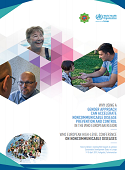Why using a gender approach can accelerate noncommunicable disease prevention and control in the WHO European Region (2019)

Download
Noncommunicable diseases (NCDs) are the main causes of ill health for women and men in the WHO European Region. NCD indicators in all countries reveal important differences between men and women across the life-course. Biology is important in shaping these differences, but it does not explain them all. Gender norms and roles put women and men at different levels of exposure and vulnerability to NCD risk factors and impacts the way men and women use services and the responses they receive.
Gender stereotypes and inequalities affect access and use of health resources and may be perpetuated by health promotion efforts. Recent political commitments call for better integration of gender in NCD policies, programmes, research and interventions. The Strategy on women’s health and well-being in the WHO European Region and the Strategy on the health and well-being of men in the WHO European Region provide a comprehensive working framework for improving health and well-being in Europe through gender-responsive approaches.



